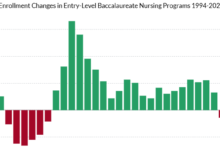Midwives set out pay and career progression demands

“Immediate and decisive action is needed to save the UK’s maternity workforce,” the Royal College of Midwives (RCM) has warned in its evidence to the NHS Pay Review Body for 2024-25.
The RCM said morale and motivation among midwifery staff was at “rock bottom” due to cost-of-living rises, service pressures, staff shortages and lack of progression opportunities.
“The government must do all it can to retain the midwives we have”
Gill Walton
It called for a pay increase for its members that was above inflation, “across the board” and consolidated, as well as a “credible plan” to restore pay lost over time to increased living costs.
The college also wanted to see measures to improve retention including better career progression opportunities and Agenda for Change bandings that matched job responsibilities.
It warned that almost one in two midwives in band 6, and four in 10 midwives in band 7, were at the top of their pay bands, with many feeling unable to progress.
“The lack of opportunities for career progression for both midwives and [maternity support workers] remains a concern,” the RCM said in its submission.
“As we have highlighted previously, this will have a damaging impact on the attractiveness of both roles as a career.
“With the majority at the top of their pay band (the full rate for the job), inability to progress in both career and salary is keenly felt.
“A clear message from discussions with RCM activists was the frustration felt by experienced midwives at the top of band 6.”
Midwifery staff also needed to be rewarded fairly for additional hours worked and protected from burnout, the college urged.
Other unions such as Unison, Unite and GMB have boycotted the NHS Pay Review Body process for 2024-25 and submitted their evidence directly to the government instead.
Meanwhile, Scotland is once again taking part in collective bargaining between the government, unions and employers to decide a pay award, rather than using the pay review body.
While it has used the pay body process, the RCM highlighted concerns about the pay round being delayed like previous years and the government’s insistence that the pay award be “affordable”.
“The cost of a decent pay award should be weighed against the costs of not taking action to stem the tide of midwives leaving the NHS,” it said.
“Pay is a key factor in recruitment and retention: there is no resolution to the growing crisis in maternity services without it.”
In the future, the RCN wanted to see the NHS Staff Council, which is made up of representatives from unions and employers, provided with more power to “negotiate and address structural issues facing the Agenda for Change system”.
The RCM also highlighted how its members in Northern Ireland were still without a 2023-24 pay deal and called for the newly returned executive to resolve that as an “absolute priority”.

Gill Walton
Commenting on its submission, Gill Walton, RCM’s general secretary, said: “The government must do all it can to retain the midwives we have.
“Urgent action on staff retention is crucial and while pay is not the whole solution, it is absolutely a key factor to staff wanting to stay working in the NHS.”
The submission comes after the RCM and 13 other unions published a joint report setting out the case for NHS staff to receive a “meaningful” pay deal for 2024-25.





